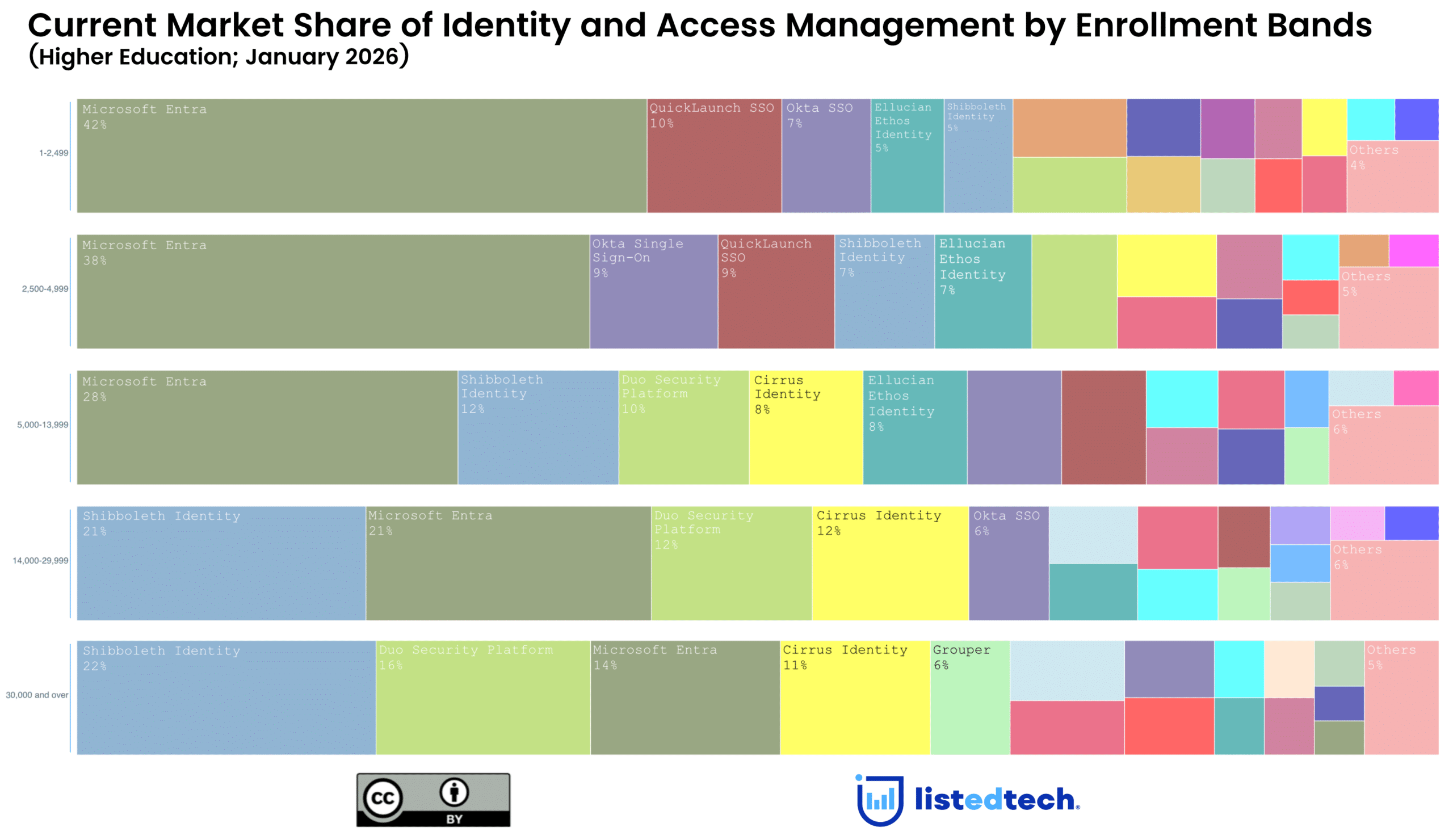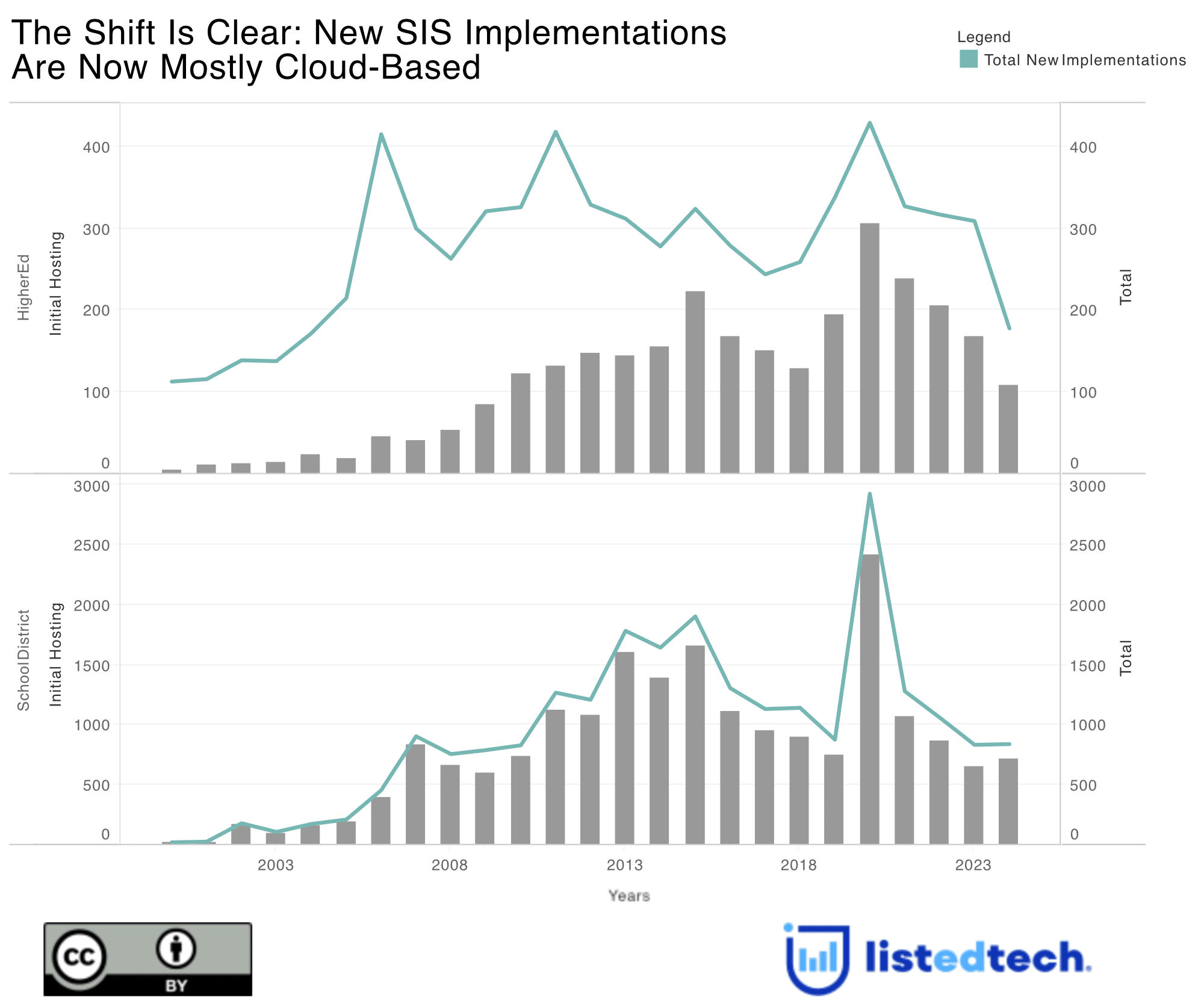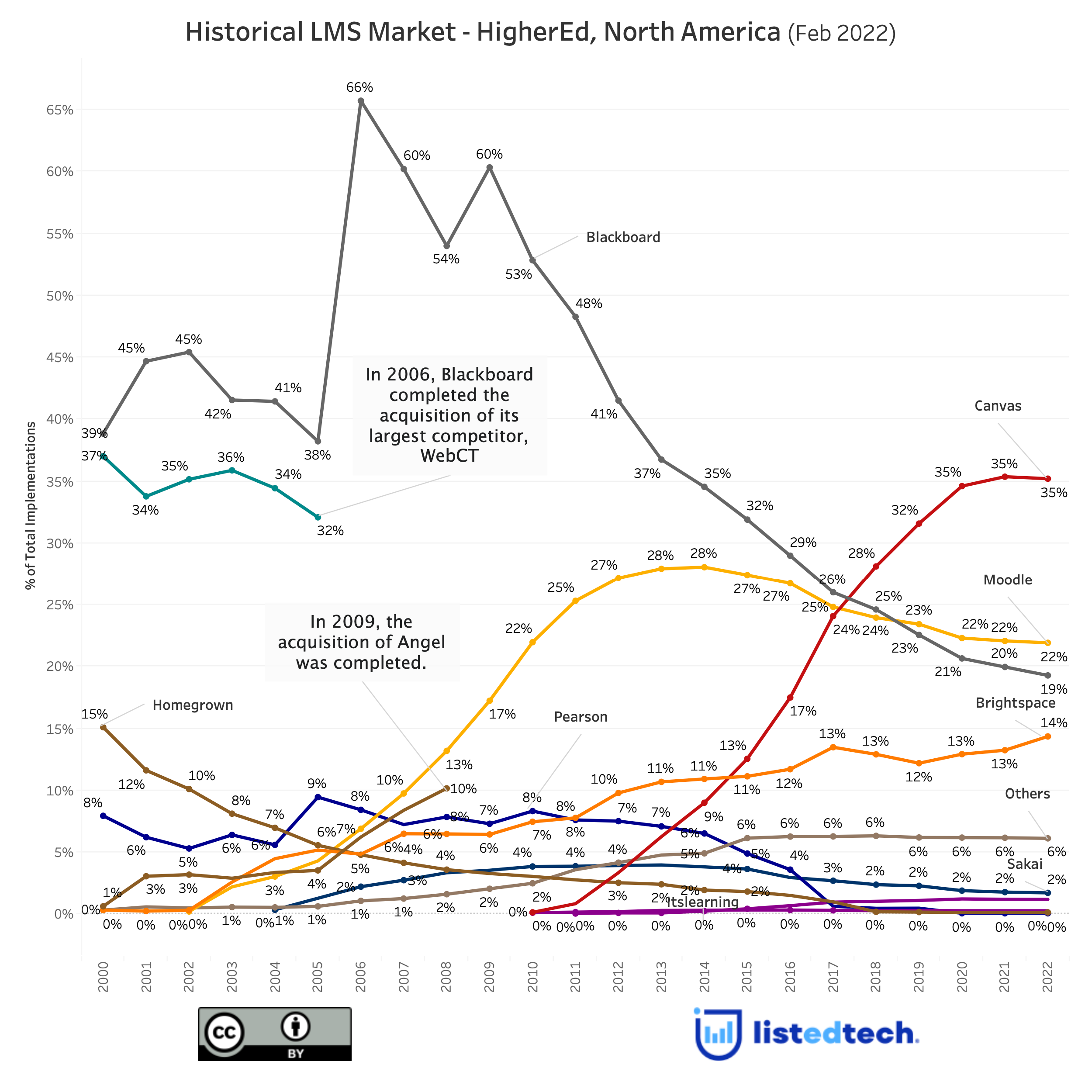
It’s time for another company profile. For this post, we want to paint the picture of one of the first LMS companies: Blackboard. Once the leading company in this product category, Blackboard diversified its corporate assets to curb the decline of revenues and to explore new business opportunities.
To understand how Blackboard started, we need to look at two companies: Blackboard itself and CourseInfo. The idea behind CourseInfo was to offer an interactive learning network to help teachers and professors adapt to the new reality of teaching at the time of the Internet. Within a few years, the company built a portfolio of 15 institutional clients including Cornell University, University of Pittsburgh and Yale Medical School.
In 1997, Michael Chasen and Matthew Pittinsky founded Blackboard with an innovative approach in mind: proposing an online learning solution and thinking through online learning standardization. About a year later, Chasen met with Stephen Gilfus, one of CourseInfo’s co-founders, and together they decided to join forces to form an improved version of Blackboard to attract new capital and scale the business.
They renamed the CourseInfo platform: Blackboard’s CourseInfo. At the time, the company offered a hosted version for teachers to try out for free. After only one year in business, its sales almost hit US$1 million. The newly formed company also created different versions of the original platform: Blackboard Classroom and Blackboard Campus.
By 2006, after the merger with WebCT, the platform was used in more than 65% of U.S. college campuses. In order to be implemented in many institutions across the United States, the company went through an important expansion funded through venture capital from a number of investors. At this time the company renamed its course management system to a new category: the “Learning Management Systems”.
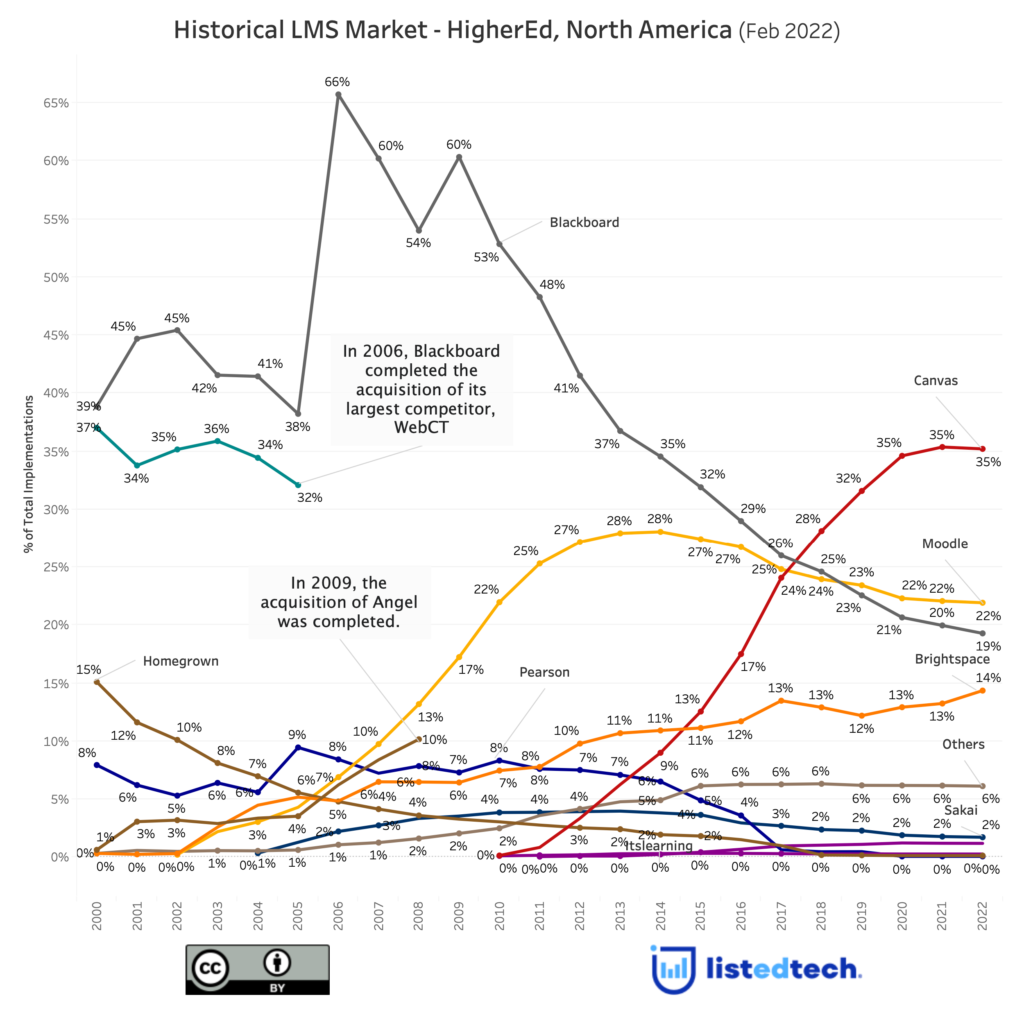
Overseas expansion began in the early 2000s, growing to include Asia, Australia and Europe. In June 2004, Blackboard went public under the stock market ticker BBBB.

Mergers and Acquisitions
Blackboard has acquired other companies to limit competition and expand into new business markets. The firm purchased Prometheus, a solution built by George Washington University, in 2002. Blackboard then acquired its main competitor, WebCT, in 2006, increasing its share of the higher education industry to between 65 and 75 percent. Over the years, Blackboard Xythos, Blackboard Connect, Blackboard Mobile, Blackboard Collaborate, and Blackboard Analytics were among the new products and acquisitions. In 2009, the purchase of ANGEL Learning increased Blackboard’s client base to nearly 6,000. The corporation invested massively (more than $500 million) on acquisitions between 2006 and 2012.
Between 2012 and 2016, the LMS company has also made acquisitions in other product categories such as collaboration tools, help desk, payment solutions, alert notifications, online program management, video conferencing, and business analytics. Blackboard’s acquisitions were not limited to the North American market; they also included enterprises from other continents. Outside of the United States, Moodlerooms Inc. and NetSpot are probably the most well-known purchased enterprises. These two companies became the basis of Blackboard’s Open Source Services division.
Even though most of the business done by Blackboard is in the U.S., it has been dominant on a global scale during the Moodlerooms years.
Complete List of Transactions Linked to Blackboard
| YEAR (most recent on top) | COMPANY NAME | PRODUCT CATEGORY | NOTES |
| 2021 | Anthology | Multiple | Merger between Blackboard and Anthology |
| 2020 | Learning Technologies Group | LMS | Blackboard sold its open LMS products to LTG for USD32 million. |
| 2019 | Reverence Capital Partners | Payment Solutions | Blackboard sold Transact Campus to RCP. |
| 2016 | Fronteer Limited | LMS | Acquisition by Blackboard |
| 2016 | Higher One | Payment Solutions | Acquisition by Blackboard |
| 2016 | Sequoia Retail Systems | Payment Solutions | Acquisition by Blackboard |
| 2015 | Blue Canary | Predictive Analytics | Acquisition by Blackboard |
| 2015 | Nivel Siete | LMS | Acquisition of leading Moodle provider in Latin America by Blackboard |
| 2015 | X-Ray Analytics | Predictive Analytics | Acquisition by Blackboard |
| 2015 | Remote-Learner UK | LMS | Acquisition of an open-source LMS solution by Blackboard |
| 2015 | Schoolwires | Website Solutions | Acquisition by Blackboard |
| 2014 | ParentLink | Community Engagement | Acquisition by Blackboard |
| 2014 | Requestec | Real-Time Communications | Acquisition by Blackboard |
| 2014 | CardSmith | Campus Card Solutions | Acquisition by Blackboard |
| 2014 | PerceptIS | Help Desk Solutions | Acquisition by Blackboard |
| 2014 | MyEdu | Career Readiness Solutions | Acquisition by Blackboard |
| 2012 | Moodlerooms | LMS | Acquisition by Blackboard |
| 2012 | NetSpot | eLearning Technology Services | Acquisition by Blackboard |
| 2011 | CerBibo Corporation | LMS | Acquisition by Blackboard |
| 2011 | Edline | LMS | Merger between Blackboard and Edline |
| 2011 | Providence Equity Partners | Investment | Acquisition of Blackboard by Providence Equity Partners for USD1,640 million |
| 2011 | iStrategy Solutions | Business Intelligence and Analytics | Acquisition by Blackboard for USD13 million |
| 2011 | Presidium Learning | Student Services Support | Acquisition by Blackboard for USD53 million |
| 2010 | Wimba | LMS | Acquisition by Blackboard for USD47 million |
| 2010 | Elluminate | LMS | Acquisition by Blackboard for USD44 million |
| 2010 | Saf-T-Net | Alert Notification | Acquisition by Blackboard for USD34 million |
| 2009 | Terriblyclever Design | Web Application Developper | Acquisition by Blackboard |
| 2009 | ANGEL Learning | LMS | Acquisition by Blackboard |
| 2008 | NTI Group | Alert Notification | Acquisition by Blackboard for USD166 million |
| 2006 | WebCT | LMS | Acquisition by Blackboard for USD178 million |
| 2002 | Prometheus | LMS | Acquisition by Blackboard |
Coming Back to its Core Business
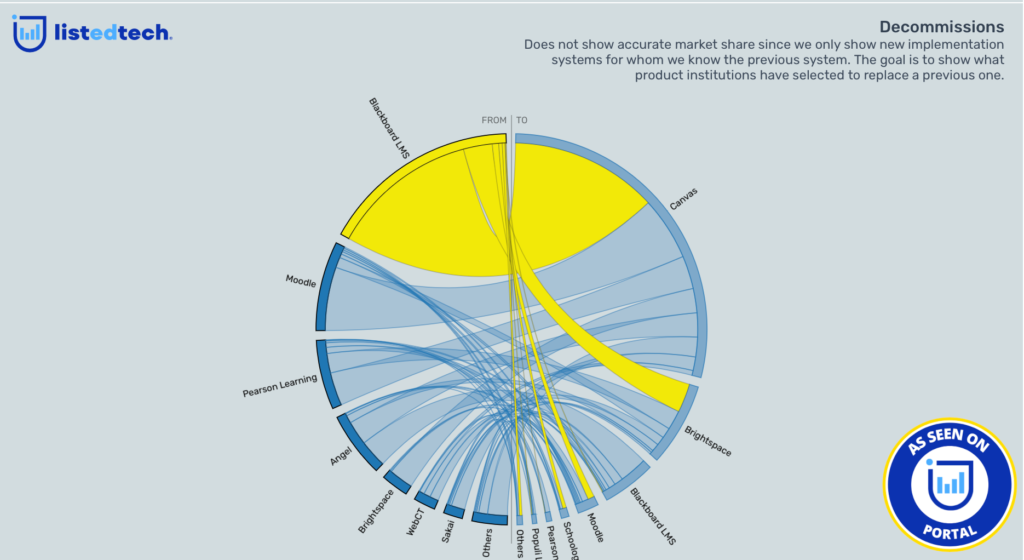
After the difficult passage through the loss of Moodle certification in 2018 that led to the sale of Moodlerooms, Blackboard was in financial difficulties and tried to improve its situation. In order to remain closer to its mission of providing education services to institutions, the company sold Transact to focus on learning solutions.
Despite having bought several LMS competitors, Blackboard struggled with maintaining its clients. At the time of the Transact’s sale, Blackboard was in high debt, an estimated USD 1.3 billion, based on e-Literate article. By selling Transact, they could cut this debt by half while “remain laser-focused on and continue to deliver market-leading innovation in its teaching and learning portfolio of solutions” as mentioned in the press release at the time. This transaction also helped Blackboard cut on massive expenses (office space, employees and R&D).
Anthology: A Brighter Future for Blackboard?
After several years of business difficulties and financial struggles, Blackboard may have found an ally in Anthology. Announced with pride by both companies in September 2021, the acquisition merger “will result in the end of Blackboard as a freestanding company, and could bring the end of its well-known, and sometimes controversial, brand” (Inside HigherEd). We also covered the merger in a separate post.
Will Anthology swallow Blackboard and rename its products with the Anthology branding? As of March 2022, the Blackboard website proudly mentions that it is now part of Anthology. On the Anthology website, it does not mention the Blackboard products. It may only be a question of time…

